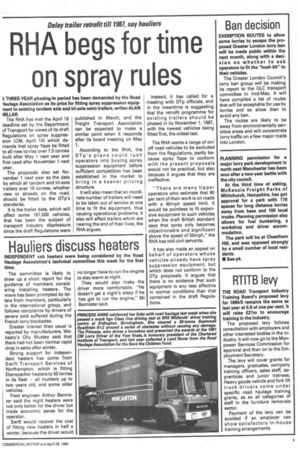RHA begs for time on spray rules
Page 5

If you've noticed an error in this article please click here to report it so we can fix it.
THREE-YEAR phasing-in period has been demanded by the Road laulage Association as its price for fitting spray suppression equipTient to existing tandem axle and tri-axle semi-trailers, writes ALAN 41ILLAR.
The RHA has met the April 19 deadline set by the Department of Transport for views of its draft Regulations on spray suppression (CM, April 14) which demands that spray flaps be fitted to all new lorries over 7.5 tonnes built after May 1 next year and first used after November 1 next year.
The proposals also set November 1 next year as the date by which all tandem and tri-axle trailers over 16 tonnes, whether new or already on the road, should be fitted to the DTp's standards.
It is the trailer date, which will affect some 167,000 vehicles, that has been the subject of transport industry displeasure since the draft Regulations were published in March, and the Freight Transport Association can be expected to make a similar point when it responds after its board meeting on May 1.
According to the RHA, the DTp's plans could rush operators into buying spray suppression equipment before sufficient competition has been established in the market to bring in a keener pricing structure.
It will also mean that an inordinate number of trailers will need to be taken out of service at one time to fit the equipment, thus causing operational problems. It also will affect trailers which are nearing the end of their lives, the RHA argues. Instead, it has called for a meeting with DTp officials, and in the meantime is suggesting that the retrofit programme for existing trailers should be phased in by November 1, 1987, with the newest vehicles being fitted first, the oldest last.
The RHA wants a range of on/ off road vehicles to be excluded from the Regulations, partly because spray flaps to conform with the present proposals would not be practical, but also because it argues that they are ineffective.
"There are many tipper operators who estimate that 90 per cent of their work is on roads with a 40mph speed limit. It would be pointless to fit expensive equipment to such vehicles when the draft British standard says that spray only becomes objectionable and significant above the speed of 50mph," the RHA has told civil servants.
It has also made an appeal on behalf of operators whose vehicles already have spray suppression equipment, but which does not conform to the DTp proposals. It argues that there is no evidence that such equipment is any less effective in normal conditions than that contained in the draft Regulations.




































































































